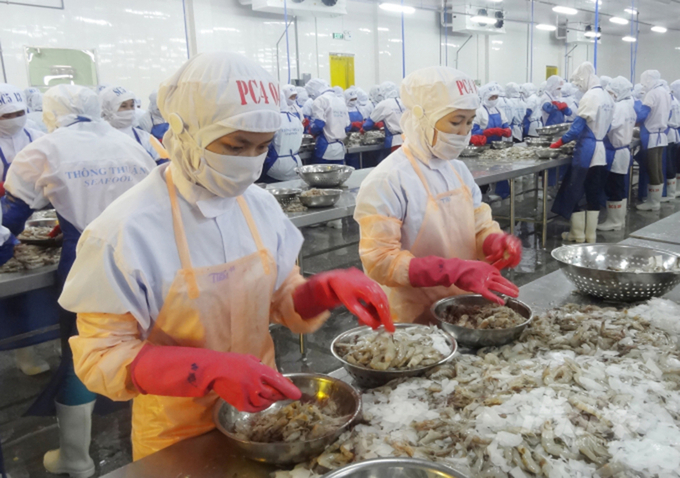November 19, 2025 | 06:36 GMT +7
November 19, 2025 | 06:36 GMT +7
Hotline: 0913.378.918
November 19, 2025 | 06:36 GMT +7
Hotline: 0913.378.918

Shrimp processing in preparation for export at a facility belonging to Thong Thuan Company. Photo: Son Trang.
According to the Vietnam Association of Seafood Exporters and Producers (VASEP), Vietnam's seafood exports to the United States are experiencing remarkable growth throughout 2024. Estimates indicate that seafood exports to the U.S. have reached at least 1.5 billion USD in the first ten months of 2024, marking an increase of 15% compared to the corresponding period in 2023. The total revenue from seafood exports to the U.S. will reach an estimated 1.85 billion USD by the end of the year, which is an increase of 19% from 2023.
The United States has maintained its position as Vietnam’s largest market for seafood exports for many years, with annual revenues reaching between 1.5 billion and 2.1 billion USD. Notably, seafood exports to the U.S. reached nearly 1.6 billion USD in 2023, accounting for 17% of Vietnam’s total seafood export value.
The United States' status as the largest market for Vietnamese seafood has raised concerns regarding how a second term for Donald Trump can potentially affect Vietnam’s seafood exports to the U.S.
Le Hang, VASEP’s Communications Director, noted that specific U.S. trade policies under Donald Trump present both opportunities and challenges for Vietnam's seafood exports in the immediate future.
Regarding opportunities, the ongoing U.S.-China trade tensions can lead to significant changes in supply chains and imports nationwide, including seafood. Accordingly, the U.S. may reduce seafood imports from China and seek alternative suppliers, with Vietnam positioned as a potential replacement.
Shrimp and shark catfish are currently Vietnam’s primary seafood export items to the U.S. An increase in U.S. tariffs on seafood imports from China can introduce considerable opportunities for these Vietnamese products, thereby supporting further growth for seafood exports to the U.S. On the other hand, China may also reduce its seafood imports from the U.S. and shift toward importing alternative products from Vietnam and other countries.
Escalating trade conflicts cause significant disruptions in global seafood supply chains, which can allow Vietnam to establish itself as a reliable alternative source for countries aiming to circumvent U.S. tariffs. This shift can position Vietnam as a preferred supplier within the global seafood supply chain.
While the U.S.-China trade war offers numerous advantages for Vietnamese seafood, the domestic seafood business community faces various U.S. trade defense measures, including anti-dumping and countervailing duties, as well as strict product quality standards.
Le Hang noted that despite the growing favorability of anti-dumping duties on Vietnamese shrimp and pangasius and countervailing duties on Vietnamese shrimp imports to the U.S. in 2024, Vietnamese seafood businesses must maintain a cautious approach and formulate strategic plans when exporting to this market.
Under the Trump administration, the U.S. government has raised its food safety and quality standards. Consequently, Vietnamese seafood exporters will be forced to meet stricter food safety regulations, thereby increasing production and inspection costs.
Furthermore, U.S. protectionist policies and tariffs may heighten competition between Vietnam and other major seafood-exporting countries to the U.S., such as India, Ecuador, and Indonesia.
In response to these opportunities and challenges, Le Hang recommended Vietnamese seafood businesses adopt a proactive and flexible approach to adapting to the shifts in U.S. market dynamics, especially amid changing international trade policies.
Most importantly, exported seafood products must fully comply with the standards set by the U.S. Food and Drug Administration (FDA), including regulations related to hygiene, food safety, and disease prevention.
U.S. consumers are exhibiting a growing interest in sustainability, environmental protection, and social responsibility. Consequently, Vietnamese seafood businesses should focus on sustainable production practices and strict quality control from farming to processing to meet the growing demands of the U.S. market.
Vietnamese seafood businesses should also provide transparent information on production processes, raw material origins, and quality standards, with the goal of building trust with consumers and partners in the U.S. in addition to fulfilling the requirements of key distributors, supermarkets, and retail systems in this market.
Additionally, Vietnamese seafood businesses should strengthen their competitiveness and establish rapid response plans to address any changes in U.S. tariffs and trade defense measures.
For over 20 years, Vietnam’s seafood industry has faced multiple anti-dumping lawsuits in the U.S., which had considerable impacts on its two main export items: shrimp and shark catfish. Vietnamese shrimp exports have also recently come under a new countervailing duty investigation targeting warm-water shrimp.
These anti-dumping and countervailing lawsuits have posed significant challenges for Vietnamese companies exporting shrimp and shark catfish to the U.S. However, according to To Tuong Lan, the positive outcome of these lawsuits is the industry's growth; namely, Vietnamese seafood businesses have emerged more resilient and experienced after every lawsuit.
Translated by Nguyen Hai Long

(VAN) 'If we can address disease challenges and properly plan farming zones, Vietnamese shrimp can absolutely rise to lead the world,' Mr. Le Van Quang affirmed.

(VAN) The year 2025 continues to mark a significant footprint for Chanh Thu Fruit Import-Export Group Joint Stock Company (Chanh Thu Group) in the international market.

(VAN) Participating in the exhibition celebrating the 80-year tradition of the Agriculture and Environment sector, Dong Giao Food Export Joint Stock Company (DOVECO) showcased a range of products utilizing new technologies.

(VAN) Vietnam’s pepper export turnover in the first 10 months of 2025 reached $1.39 billion, already surpassing the full-year figure of 2024.

(VAN) AGRITECHNICA 2025 has impressively reaffirmed its position as the world’s leading trade fair for agricultural machinery.
/2025/11/17/4947-2-104601_225.jpg)
(VAN) The international market is growing rapidly, creating major opportunities for Viet Nam's tilapia industry.
/2025/11/17/1234-2-010716_981.jpg)
(VAN) Deputy General Director of Viet Nhat Group Nguyen Dang Ngoc shared experiences on building linkage chains and developing sustainable tilapia farming that meets international standards.